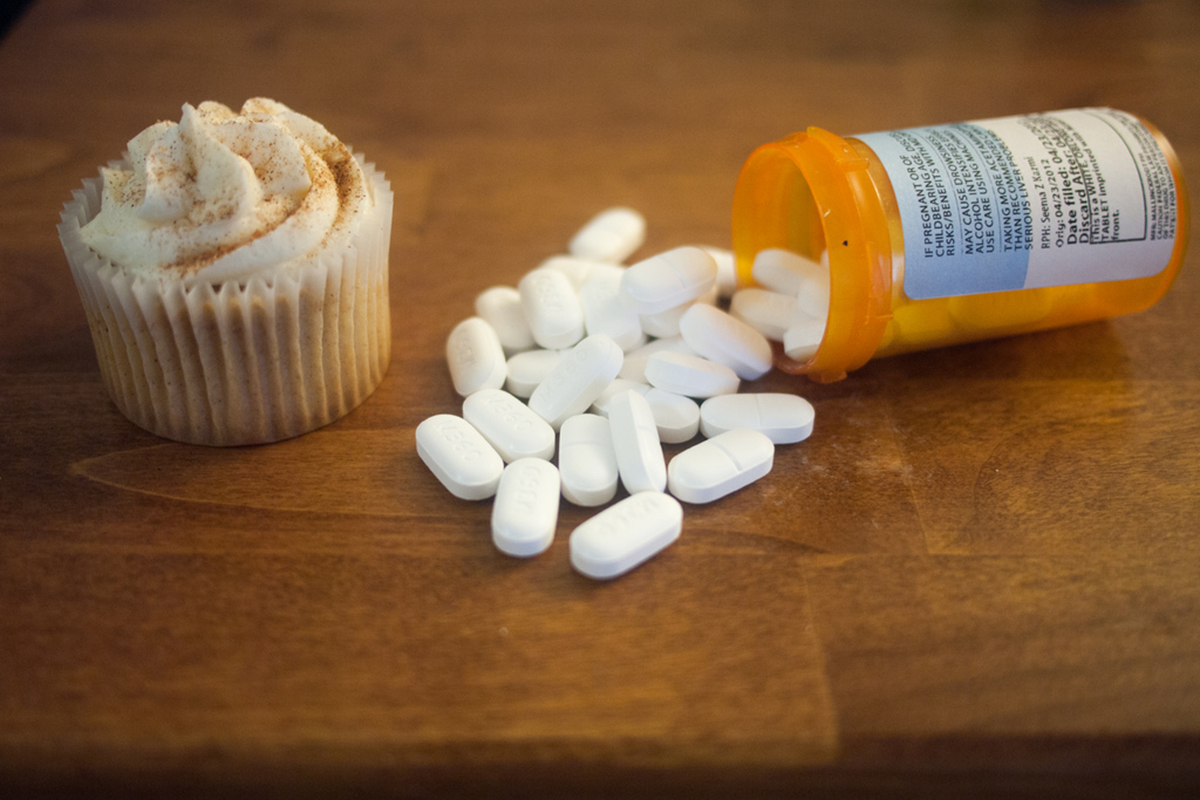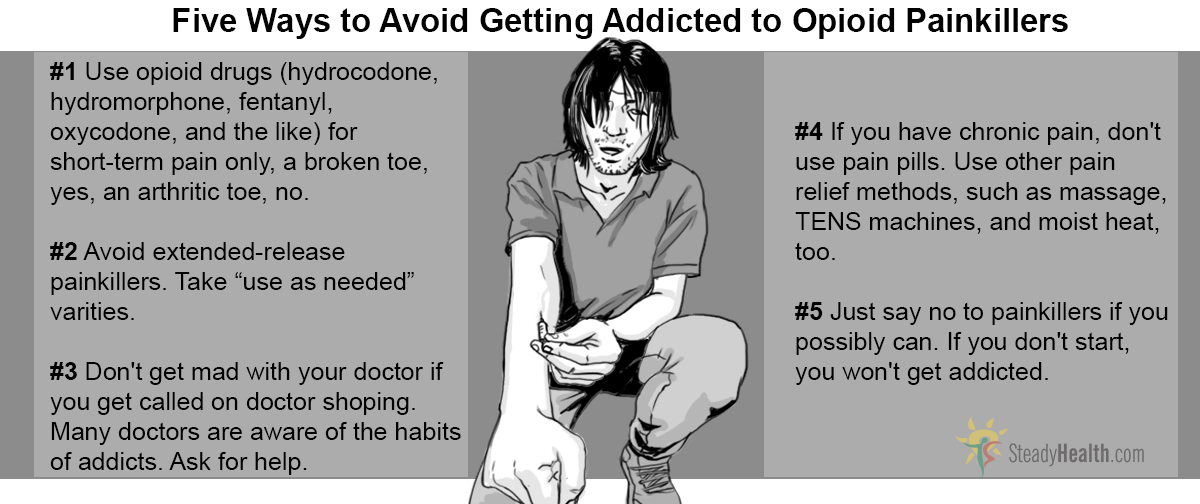The opioid painkillers are a family of drugs that includes the opiates hydrocodone (Vicodin), hydromorphone (Dilaudid), morphine, codeine, fentanyl, and oxycodone, anong others. (The painkllers are described as opioid, while the pain relieving agent in them is an opiate.) The unique characteristic about these drugs is that if a smaller dose achieves pain relief, a larger dose results in even more pain relief. It's the increasing effects of increasing doses that makes them very addictive.
But if you take one tablet of oxycodone for your back pain, two will make you feel even less pain, and 10 might make you feel terrific. But the more opiate painkillers you take, the more you need, and once you get started, it's hard to quit.
It's better not to become addicted in the first place. Here are 10 suggestions.
1. Choose your family well.
OK, it isn't really possible to choose your biological family. However, if a first-degree relative, that is, your mother, your father, your brother, or your sister suffers an addiction to opioid painkillers, there is a 40 to 70% chance that you will, too. Personal choices and willpower do make a difference, and environment does, too, but the predilection for addiction is largely, just not totally, genetic.
If you never come in contact with painkillers, of course, you won't ever be addicted to them. On the other hand, even if no one in your family is addicted to painkillers, you may have a problem with them due to your unique combination of life experiences.
What can you do if you know you have a genetic predisposition to opiate addiction? Stay away from the drugs. Making sure you don't get started with opiates is the easiest way to avoid addiction, although the social and family costs of staying away from drugs may be very high.
2. Use opioid painkillers for acute pain, not chronic pain.
The best use for opioid painkillers is to treat severe pain that will diminish soon. Heart attack patients are usually given morphine, which has the added benefit of reducing the amount of blood the heart has to pump. Vicodin may be prescribed for a dislocated shoulder, at least until it is popped back into place. Oxycontin may be prescribed for a broken back.
If pain isn't going to go away any time soon, it is generally a mistake to prescribe a drug that will drive a desire for more, more, more. People who are expected to die of their injuries or disease are offered opiates, but people who have to live with chronic pain need other kinds of treatment.
See Also: Medical Drug Addicts
3. Don't mistake mental clarity for lack of side effects.
People who are addicted to opioid painkillers, as long as they continue to get their drugs, usually do not suffer obvious mental side effects. Their judgment (at least on matters not related to drug use) is usually sound, and they are safe driving and operating heavy machinery. Mental clarity, however, usually depends on ever increasing doses of the drug, and the first few hits at a higher dosage level can be accompanied by dangerous emotional and mental instability.
More Considerations For Staying Off Opiates
4. Just say no to Zohydro.
Zohydro is a new, extended-release, longer-acting form of hydrocodone that has even more addictive potential than the already-addictive medications it is meant to replace. This drug was approved for use in the USA by the FDA in April 2014.

5. If you have to take opioid drugs, stick to their short-acting versions.
Doctors sometimes offer long-acting opioid drugs for treating chronic pain. If you feel OK with a short-acting drug you take on an "as needed" basis, however, it is better to stay on the short-acting drug, which always has less potential for addiction.
6. For acute pain, use one or two forms of pain relief. For chronic pain, use multiple forms of pain relief.
Even if you use opioid medications for chronic pain, which greatly increases the risk of addiction, you can reduce your risk of addiction by using multiple forms of pain relief.
Use trancutaenous electroneural stimulation (TENS). Try moist heat. Go for a massage. See a hypnotist or a biofeedback specialist. Try herbs and changes in your diet. It's OK just to take a pill if you are only going to take the medication for a week to two weeks, but for any kind of pain that lasts more than 2 weeks, try multiple approaches, letting each one do its healing work.
7. Don't let your doctor prescribe multiple opioid medications without explaining the reason why.
Sometimes doctors prescribe both the short-acting and long-acting versions of a painkiller, or prescribe two or even more different opioid painkillers. Both of these practices can lead to drug dependency, and should be explained to you before you accept the prescription. Most pharmacies flag this kind of prescribing--so get all of your prescriptions filled at the same pharmacy. A possible exception to this rule: Two different forms of administration, such as a fentanyl patch, applied to the skin, and hydrocodone tablets taken orally.
8. Increased sensitivity to pain is a (nearly) sure sign of addiction.
Taking the equivalent of more than 120 mg of hydrocodone per day can lead to a condition called hyperalgesia, or increased insensitivity to pain. Obviously, if taking very high doses of pain relievers starts making you more sensitive to pain rather than less, and you can't stop taking the medications without withdrawal symptoms (vomiting, diarrhea, severe rebound pain), you need medical intervention. Doctors disagree about the concept of hyperalgesia, but if you have it, you will know it.
9. Avoid dysfunctional coping behaviors.
Some people who have chronic pain develop a fear of movement, due to the misconception that using one's sore and aching body will cause further damage.
Don't let others protect you from your own capabilities. If you are going to hurt whether you sit at home and watch television or you get outside and take a walk, and the walk isn't going to do you further damage, go on the walk.
See Also: Oxycontin Addiction: Withdrawal methods & recovery
10. Don't get angry when your doctor suggests non-opioid pain relievers, especially if you are addicted.
Many doctors are aware when their patients are doctor-shopping to get multiple presecriptions fo drugs--and insurance companies usually are aware of the problem, too. Don't get mad when your doctor won't give you the addictive painkillers you request. He or she is just trying to save you from a condition that is just as disabling as your pain.
- Chou, Roger MD. Argoff Charles H. MD. 11 Tips for Better Opioid Prescribing. Medscape News. 10 September 2014.Mind map by SteadyHealth.com
- Photo courtesy of JosephLeonardo by Flickr: www.flickr.com/photos/joeruny/6960822698



Your thoughts on this